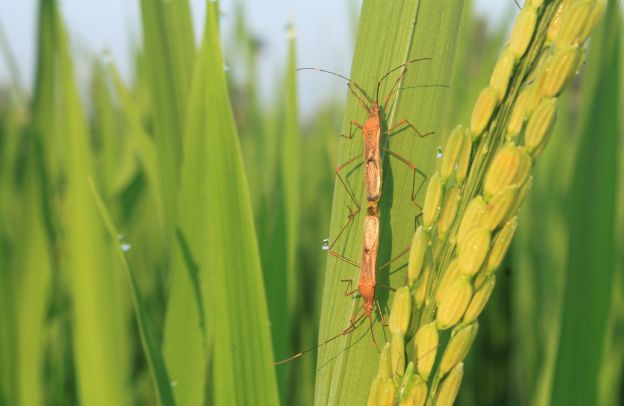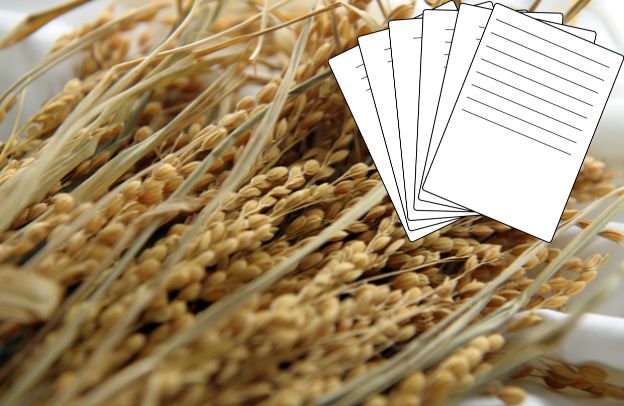Managing Pest And Disease Outbreaks In Rice Production In Africa

Do you want to learn about managing pest and disease outbreaks in rice production in Africa? Then keep reading. Pest and disease outbreaks can have a significant impact on rice production in Africa, leading to decreased yields, increased costs, and reduced income for farmers. However, with the right management strategies and technologies, these outbreaks can be controlled and minimized.
Get a FREE GUIDE for your small and medium-scale farming business.
This article will explore the most common pests and diseases that affect rice management strategies and technologies that can be used to control and minimize their impact.
Common pests and diseases in rice production
Some of the most common pests and diseases that affect rice production in Africa include:
- Brown plant hopper (BPH): This pest causes damage to rice plants by feeding on their sap, leading to wilting and reduced yields.
- Rice stem borer: This pest causes damage to rice plants by boring into their stems, leading to reduced yields and increased costs.
- Rice blast: This fungal disease causes leaf spotting and can lead to significant yield loss if left uncontrolled.
- Rice tungro virus: This viral disease can cause significant yield loss and is spread by insect vectors.
- Sheath blight: This fungal disease can cause significant yield loss if left uncontrolled.
Eco-Agriculture pest control services in rice fields
Pest control is a critical component of rice production, as pests can cause significant damage to crops and reduce yields. Traditional pest control methods, such as the use of pesticides, can be effective in controlling pests, but they also have negative impacts on the environment and human health.
Eco-agriculture, which is a holistic approach that integrates environmental, social, and economic considerations, offers a sustainable solution for pest control in rice fields.
What is Eco-Agriculture?
Eco-agriculture is an approach to agriculture that aims to optimize the use of natural resources while minimizing the negative impacts of farming on the environment.
It involves the use of integrated pest management (IPM) strategies and conservation agriculture practices, such as crop rotation, intercropping, and agroforestry, which can help to reduce the need for pesticides and improve the resilience of rice crops to pests and diseases.
How Eco-Agriculture can improve pest control in rice fields
Eco-agriculture can improve pest control in rice fields by:
- Promoting biodiversity: By promoting biodiversity in the rice fields, eco-agriculture can help to reduce the abundance of pests and increase the populations of natural predators and parasites.
- Enhancing natural pest control: Eco-agriculture can enhance natural pest control by promoting the use of beneficial insects, such as ladybugs, lacewings, and parasitic wasps, which can help to control pest populations.
- Improving soil health: Eco-agriculture can improve soil health by promoting conservation agriculture practices, such as crop rotation and intercropping, which can improve soil fertility and increase the resilience of rice crops to pests and diseases.
- Reducing pesticide use: Eco-agriculture can reduce pesticide use by promoting the use of integrated pest management strategies,
The effects of pest and disease outbreaks on rice production in Africa
Pest and disease outbreaks in rice production can have a number of negative effects, including:
- Reduced yields: Pest and disease outbreaks can cause significant damage to rice plants, reducing yields and decreasing the overall productivity of the rice sector.
- Increased costs: Pest and disease outbreaks can increase the costs of rice production, as farmers may need to use more pesticides or other control measures to manage the pests and diseases.
- Reduced income for farmers: Reduced yields and increased costs can lead to reduced income for farmers, making it more difficult for them to support themselves and their families.
- Food insecurity: Pest and disease outbreaks can reduce the availability of rice, contributing to food insecurity in affected communities.
- Environmental degradation: The overuse of pesticides can lead to environmental degradation and negatively impact the health of farmers and their communities.
- Loss of biodiversity: Pest and disease outbreaks can lead to the loss of biodiversity and disruption of the ecosystem
- Loss of genetic diversity: Pest and disease outbreaks can lead to the loss of genetic diversity of the rice varieties, which can negatively impact rice production in the future.
- Economic loss: Pest and disease outbreaks can lead to economic losses for farmers, traders, and the overall economy of the country.
Overall, pest and disease outbreaks can have a detrimental impact on the rice sector in Africa, and it is important to implement effective pest and disease management strategies to mitigate these effects.
The best ways to prevent Pest And Disease Outbreaks In Rice Production
Preventing pest and disease outbreaks is crucial for the success and sustainability of rice production. This can be achieved through various methods, including crop rotation, using disease-resistant varieties, proper water management, biological control methods, responsible use of chemicals, and good cultural practices.
By implementing these strategies, rice farmers can reduce the impact of pests and diseases on their crops, improve their yields, and ensure the long-term viability of their farms. Proper water management, such as controlled flooding and draining, can not only help prevent the spread of pests and diseases but also improve the overall health of the crop.
The use of biological control methods, such as the introduction of natural predators or parasites, can help reduce the dependence on chemical control methods and minimize any negative impact on the environment and human health.
Good cultural practices, such as proper field preparation, timely planting and harvesting, and maintaining field hygiene, play a crucial role in reducing the spread of pests and diseases in rice fields.
Management strategies and technologies
There are several management strategies and technologies that can be used to control and minimize the impact of pests and diseases on rice production in Africa, including:
- Integrated pest management (IPM): This approach involves using a combination of control methods, such as biological control, chemical control, and cultural control, to minimize the use of pesticides and reduce the risk of pest resistance.
- Hybrid rice varieties: The use of hybrid rice varieties can improve pest and disease resistance, reducing losses and increasing yields.
- Biological control: The use of natural predators and parasites can help to control pests and reduce the need for pesticides.
- Chemical control: The use of pesticides can help to control pests and diseases, but should be used in conjunction with other control methods to reduce the risk of pest resistance.
- Early warning systems: Early warning systems can help to detect and respond to pest and disease outbreaks quickly, reducing their impact on rice production.
Conclusion on Managing Pest and Disease Outbreaks in Rice Production in Africa
Pest and disease outbreaks can have a significant impact on rice production in Africa. However, with the right management strategies and technologies, these outbreaks can be controlled and minimized.
By using an integrated pest management approach, adopting hybrid rice varieties, using biological control methods, implementing early warning systems, and using chemical control, when necessary, farmers can help to reduce the impact of pests and diseases on their rice crops, increasing yields and improving their livelihoods.
Are you a small or medium-scale farmer? Then get our FREE GUIDE for your farming business.





